You are hereBlogs / WcP.Tomorrows.History's blog / US tied up in Iraq. China focused on Olympics. Russian tanks & troops into Ossetia, part of former Soviet republic of Georgia
US tied up in Iraq. China focused on Olympics. Russian tanks & troops into Ossetia, part of former Soviet republic of Georgia
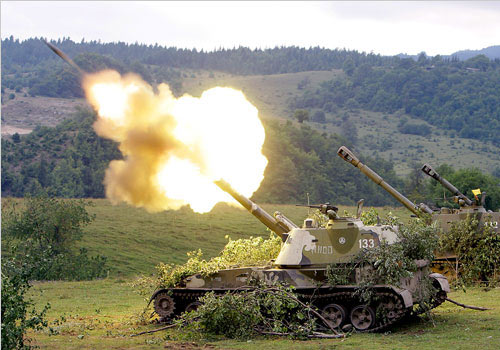
(quote)
Prime Minister Vladimir V. Putin of Russia declared that "war has started."
Shortly before dawn on Sunday, Georgia’s Interior Ministry said that Russian bombers had begun striking military facilities adjacent to the civilian airport at Tbilisi. The explosions could be heard in the city, said Shota Utiashvili, a ministry official. He said that Russia had built up large forces in Abkhazia and South Ossetia — breakaway regions that have support from Moscow — including as many as 300 artillery pieces in South Ossetia alone. Russian forces, he said, were also poised just over the border at Larsi, a checkpoint, where they could open a third line of ground attack. As Russia moved more forces into the region and continued aerial bombing, it appeared determined to occupy both South Ossetia and Abkhazia.
Georgia’s president, Mikheil Saakashvili, said Russia’s ambitions were even more extensive. He declared that Georgia was in a state of war, and said in an interview that Russia was planning to seize ports and an oil pipeline and to overthrow his government.
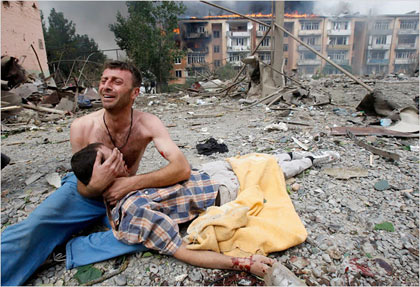
Prime Minister Vladimir V. Putin of Russia left the Olympics in China and arrived Saturday evening in Vladikavkaz, a city in southern Russia just over the border. State-controlled news broadcasts showed Mr. Putin meeting generals, suggesting that he was directly in charge of military operations, eclipsing the authority of President Dmitri A. Medvedev.
The fighting, and the Kremlin’s confidence in the face of Western outcry, had wide international implications, as both Russian and Georgian officials placed it squarely in the context of renewed cold war-style tensions and an East-West struggle for regional influence.
Other Western officials monitored the movements with alarm. "The record is crystal clear, " said a Western official, who spoke on condition of anonymity. “Russia has launched a full-scale military operation, on air, land and sea. We have entered a totally new realm — politically, legally and diplomatically.”
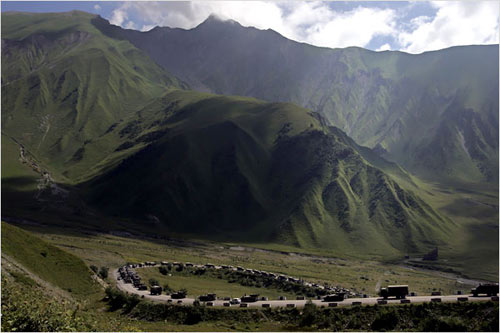
Russia appeared to be opening a second front in Abkhazia, to the west of South Ossetia, and to be aiming to drive Georgian troops from the Kodori Gorge, a small mountainous area in Abkhazia that Georgia reclaimed by force in 2006. Russia also notified Western governments that it was moving ships of its Black Sea fleet to Ochamchire, a port on the Abkhaz coast. Georgian officials said they expected Russian troops to land there.
Mr. Putin made clear that Russia now viewed Georgian claims over the breakaway regions to be invalid, and that Russia had no intention of withdrawing. “There is almost no way we can imagine a return to the status quo,” he said in remarks on Russian state television.
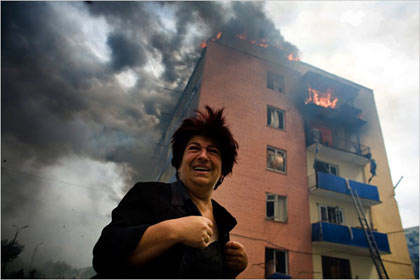
Mr. Saakashivili, the Georgian president, said Russia’s oil riches and desire to assert economic leverage over Europe and the West had emboldened Kremlin country to attack. Georgia is a transit country for oil and natural gas exports from the former Soviet Union that threatens Russia’s near monopoly. "They need control of energy routes, " Mr. Saakashvili said. "They need sea ports. They need transportation infrastructure. And primarily, they want to get rid of us. "
"If the world is not able to stop Russia here, then Russian tanks and Russian paratroopers can appear in every European capital," he said. Russian officials, however, blamed outside meddling for stoking the conflict, and said their goals were narrow.
With Russia’s Black Sea fleet, warplanes and tanks bearing down on the small, mountainous country, Georgian officials acknowledged they were taken by surprise by the intensity of the Russian response. Russian warplanes struck at least five Georgian cities. Witnesses said they struck a train station in Tsenakhi, five apartment buildings in Gori, and the Black Sea port of Poti.
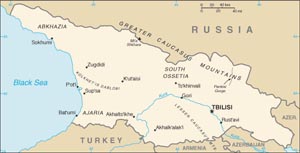
Georgian officials said that Russian warplanes had attacked the major Baku-Tbilisi-Ceyhan oil pipeline, operated by British Petroleum, that carries oil to the West from Asia, but that the pipeline had not been struck. Roads were clogged with refugees, as South Ossetians fled north into Russia and Georgians from Gori fled southeast to Tblisi. Russia said 30,000 people had fled South Ossetia.
Georgia declared its independence from the then-Soviet Union in 1991.
(unquote)
Photos courtesy of Denis Sinyakov/Reuters, Gleb Garanich/Reuters, Dmitry Kostyukov/Agence France-Presse - Getty Images, Wojtek Grzedzinski/Napo Images, and Australia.to
Original Source: NY Times and Australia.to
Slideshow: Russian Bombardment in Georgia


















